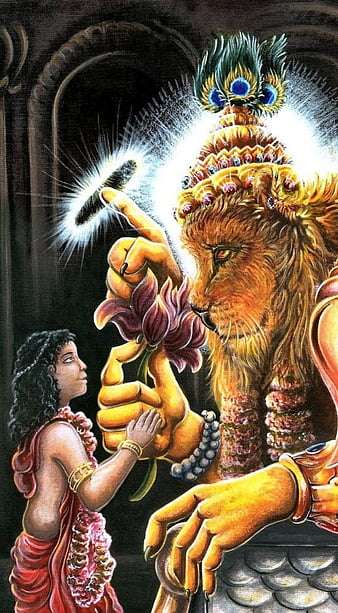Question:
Narasimha[1] is the divine personality who embodies the fury par excellence. It seems natural to ask him for protection. Instead, I see that the devotees of Krishna, when they have problems or are in peril, tend to say “Krishna, Krishna” or even “Caitanya, Nityananda” instead. Why?
Answer:
In the scriptures it is explained that the Supreme Personality of God expands into as many personalities as there are waves of the ocean, that is, unlimited. That is why he is called the “Supreme Personality of God”, meaning that God takes on many personalities, and among these Krishna is the Supreme.
avatara hy asankhyeya
hareh sattva-nidher dvijah
yathavidasinah kulyah
sarasah syuh sahasrasah
“O brahmanas, the incarnations of the Lord are innumerable rivulets, flowing from inexhaustible sources of water.”[2]
So the incarnations of the Lord can’t be counted, so many are they.
But the question you ask is legitimate. After all, Krishna is omnipotent and doesn’t need to expand into different forms to do various things. Nor does He need Devas to manage the mechanisms of the universe. It would be enough for him to want one thing, and He would have it, that thing would happen.
To understand this, it is necessary to understand how and why the Lord, his devotees, the spiritual world and the mechanisms of the material world are made.
Krishna expands because it is not natural to be alone. And it’s not even natural to be omnipotent the way we understand omnipotence to be. By just snapping His fingers and thus creating a universe, He would be deprived of rasa, taste and pleasure, the pleasure to create. Just like we all want to be in the company of others, so do the personalities in the spiritual world, and they like to do things.
Krishna also has infinite qualities and has infinite time to live. Thus are manifested a large number of beings and incarnations, each of which has a personality, that is, it does things that the others do not.
Each one of Them are different from the others. Ramacandra is different from Varaha, Varaha from Matsya, Matsya from Vamana, Vamana from Parasurama and so on. Difference generates variety, variety generates pleasure.
Narasimhadeva embodies the fury of the Lord and the desire to always protect his devotees. For this reason, it is more than understandable why traditionally, for millennia, Vaisnavas, even devotees of Krishna, have sought refuge at the lotus feet of Lord Narasimhadeva. By taking shelter of Narasimha, they take shelter of Krishna.
But could Krishna Syamasundara, who lived in Vrindavana, protect his devotees?
Certainly.
rakshe krsna mare ke,
mare krsna rakshe ke
“If Krishna wants to kill you, no one can protect you. If Krishna wants to protect you, no one can kill you.”
And also:
paritrāṇāya sādhūnāṁ
vināśāya ca duṣkṛtām
dharma-saṁsthāpanārthāya
sambhavāmi yuge yuge
“To deliver the pious and to annihilate the miscreants, as well as to reestablish the principles of religion, I Myself appear, millennium after millennium.”[3]
He destroys miscreants, but generally doesn’t do it in this particular form. It is not in His nature as Krishna of Vrindavana. The original person does not like to fight with demons, but he likes to play on the banks of the Yamuna with the Gopis and Gopas.
If one would say: wait a second, Krishna killed demons in his youth, such as Aristasura, Aghasura and Kamsa, my answer would be, it is not so. The scriptures are accurate in saying that the one who eliminated demons was actually Vasudeva Krishna, born in Mathura of Devaki and Vasudeva. The Krishna playing with his devotees was the son of Nanda Maharaja and Yasoda Mayi. They were two different personalities in the same form.
In conclusion it is right to ask Narasimhadeva for protection, knowing full well that He is an Avatara of Visnu, who is an expansion of Sri Krishna.
[1] Sri Narasimha Deva is the incarnation of Visnu in the form of half human and half lion
[2] Srimad-Bhagavatam 1.3.26
[3] Bhagavad-gita 4.8
This is a section of the book “On a Silver Platter”.
To buy the complete book, click above
Post view 1634 times




Leave a Reply